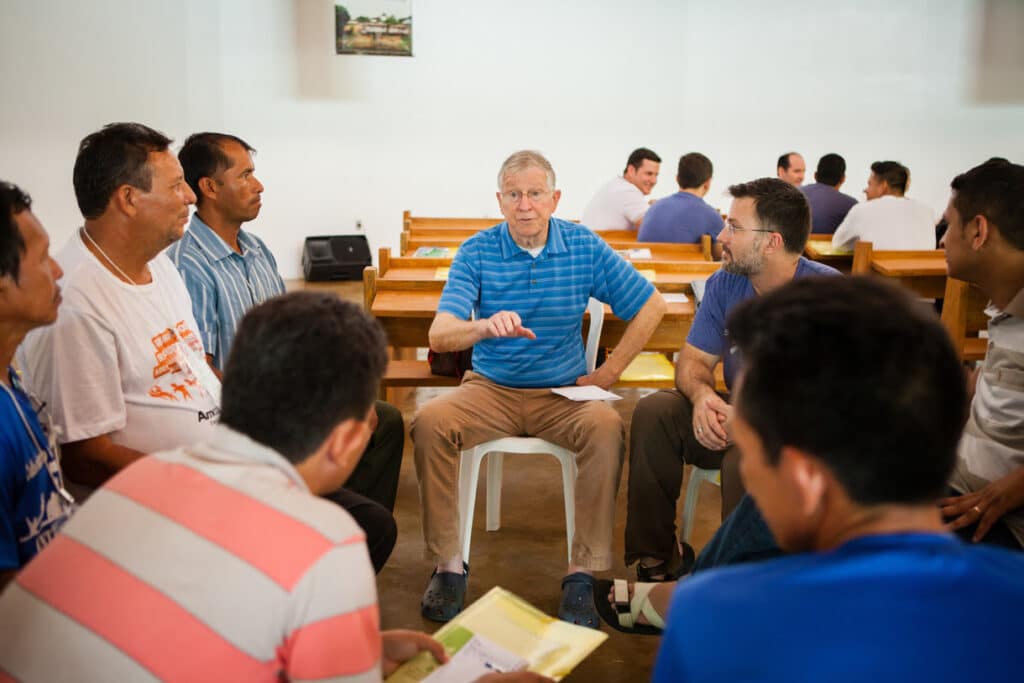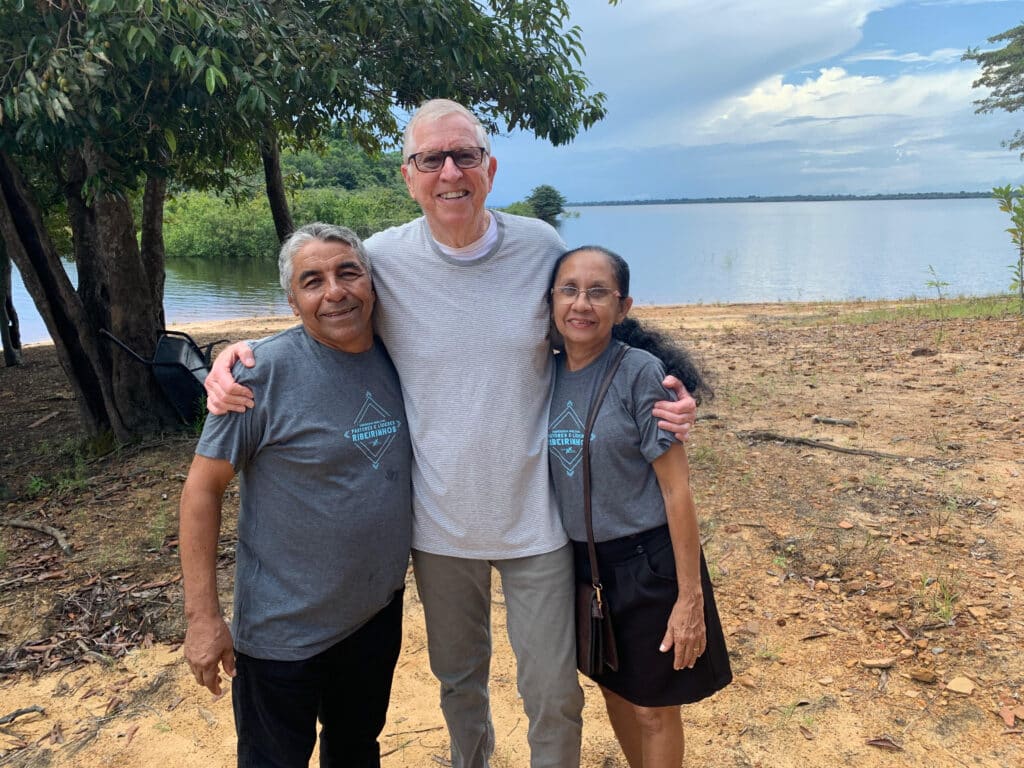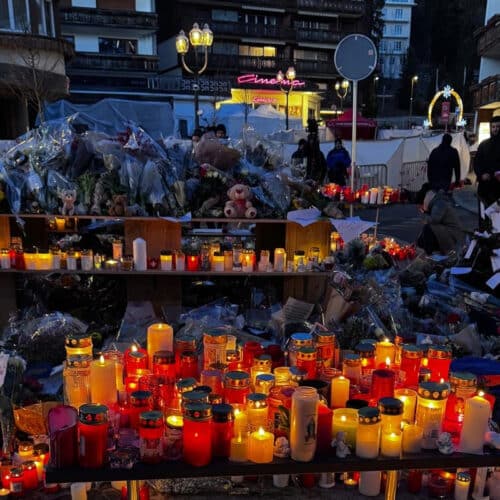Written by: Mike Minter
A seasoned pastor’s reflection on offering pastoral care in the Amazon and its ripple effect.
Having spent many years in pastoral ministry, I continue to reflect on what I could have done better, and I desire to continually learn. There are, of course, many facets to ministry as there are in all vocations of life. Preaching is actually a smaller piece of the pie than one might expect. The daily pastoral care practices of counseling, hospital visits, weddings and funerals occupy a great deal of time.
The larger the church, the more staff there are to handle such duties, often leaving the senior pastor out of touch with the needs of the flock. This is not always the case, but if not careful, it can happen. I pastored a large church for many years, but made myself available to the people so as to maintain connection with the struggles they were facing. But then again, I’m an off-the-charts extrovert.
Pastors actively engaging in pastoral care in church is important because it keeps them connected to the body of Christ and helps their church grow in faith. Pastoral care must hit three areas of life: physical, emotional and spiritual.
All of these are interconnected and very complex. So, how do pastors learn to do this effectively? One way is through guidance and training. I understand firsthand the need for this kind of support, and when God opened my heart to the people of the Amazon a decade ago, I knew this was one way I was equipped to minister to the indigenous pastors in that region.
Now, after many years of traveling to the Amazon with Justice & Mercy International to offer pastoral support and help train jungle pastors, it is clear from the get-go that they have the same problems we have, they just manifest themselves differently.
On one of my first trips, I spoke to a group of pastors huddled in a small home. They were telling me about flooding and how the gators and snakes were getting into their homes. Upon some reflection, I told them the U.S. church was suffering in a similar way. I said, “We have the largest snakes you have ever seen and gators that are eating us alive.” As I watched their eyes expand with each horrific detail, I added this explanation: “It’s called materialism.” The U.S. church has a tendency to love the world and the things that are in the world (1 John 2:15).
As I kept listening to the pastors, I grieved for them living in these horrible conditions. My dear brothers were suffering physically, emotionally, and spiritually. These are the trenches of pastoral care, and I have been privileged to meet them there. Let’s look at the three aspects of pastoral care one at a time.

Physical: The Bible is replete with commands to take care of the needy. We find this in both testaments. “He defended the cause of the poor and needy, and so all went well. ‘Is that not what it means to know me?’ declares the Lord (Jer. 22:16).”
I think this is the only verse in Scripture that tells us what it means to know the Lord. As we jump to the new covenant, James tells us, “Suppose a brother or a sister is without clothes and daily food. If one of you says to them, ‘Go in peace; keep warm and well fed,’ but does nothing about their physical needs, what good is it? In the same way, faith by itself, if it is not accompanied by action, is dead (Ja. 2:15-17).”
While the Pastors Conferences are at the core of JMI’s work in the Amazon, the organization also helps meet the ongoing physical needs of pastors and their villages–as well as emergency needs during flooding season–through things like food, hygiene and medical supplies. The pastors both receive this help and also play a crucial role in being conduits of help for their villages, as they identify needs and distribute supplies to families.
Emotional: All people living on Planet Earth suffer emotionally. There are no exceptions. The world is harsh, and thus we have the Psalms and the Sermon On The Mount to help navigate these troubling waters.
When I meet with the jungle pastors for our one-on-one time, I always ask how they are holding up. I want to know of their emotional needs. JMI always brings a counselor to work through the mental trauma and suffering. I think this is the most difficult thing for me, to listen to their stories of hardship. Though I am there to help, I often feel ill-equipped. Physical needs are tangible and can be met by supplying food and clothing, but mental needs are much harder and more complex. The irony is, the jungle pastors often help me curb my murmuring and complaining about trivial things like being out of coffee creamer. When I compare my suffering with theirs it puts life in perspective.
Spiritual: This is by far the greatest need for all people. The lost need the Gospel, and believers need to be reminded of it daily. I have been given the distinct privilege of teaching for several hours each time I go to the Pastors Conferences. Every time I meet with these dear brothers and sisters I open with this: “I know the Bible technically better than you do, but you know Jesus intimately better than I do.” And that is the truth. Here are people that daily have to rely on the Lord to provide for their needs. They have supreme confidence in the Lord as they have experienced His power.
So the question might be asked, “Why do we go if they are so mature spiritually?” Yes, they have maturity in prayer and faith, but they also have a tendency to stray from biblical truth due to lack of resources. Sarah Rodrigues, who heads up Justice & Mercy Amazon, is a great source in knowing the needs of the people. Once I have a topic from her, I will focus my teaching on that specific issue. Then, there are breakout sessions where the pastors can ask questions. I cherish this because it is what they need to hear more than anything else. They will take the teaching back to their villages where the Word will not return void (Isa. 55:10-11).

The Fruit of Pastoral Support
Each year at the Pastors Conference, the jungle pastors share testimonies of how the previous conference encouraged them and the impact it has made on their people. I know many of them show up discouraged, lonely, and hungry for God’s word, but they leave fulfilled. It’s a privilege to have had many opportunities to offer pastoral support to my brothers and sisters in the Amazon, and God has been gracious to allow us to see the ripple effect of this work, as these pastors in return, offer pastoral care to their congregations.
As I reflect back over the years, the conference has grown exponentially with one in the winter and one in the summer. There is no telling where the Lord will take this in the future. They are some of the finest people I have ever met. I always leave spiritually challenged with a thirst to leave a legacy in the Amazon for the Glory of God.
Mike Minter is a foundational part of JMI’s work in the Amazon and an Associate Teaching Pastor at Rolling Hills Community Church in Franklin, TN. He recently released Stay the Course: A Pastor’s Guide to Navigating the Restless Waters of Ministry, available here and wherever books are sold.





 304 44th Ave. N
304 44th Ave. N

